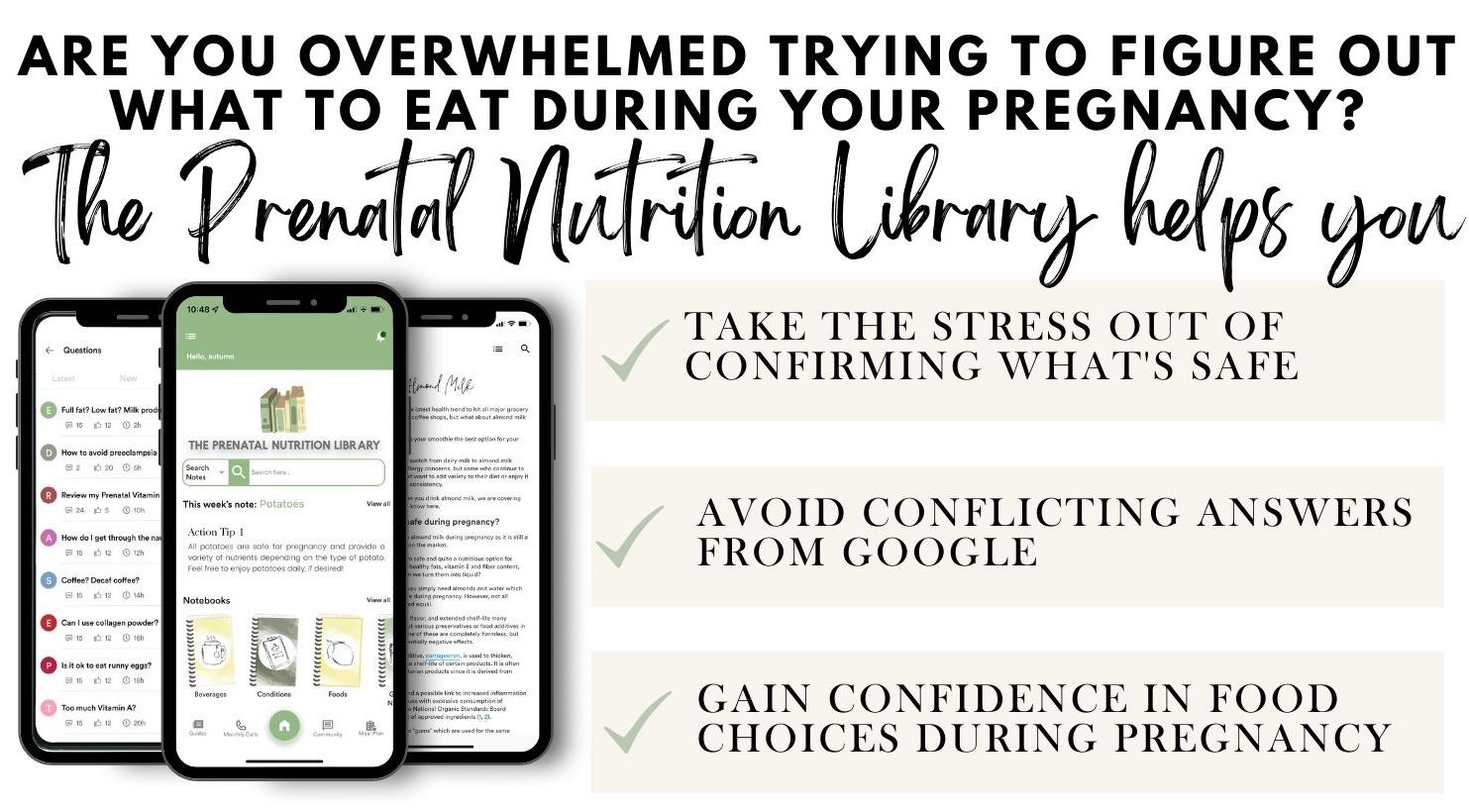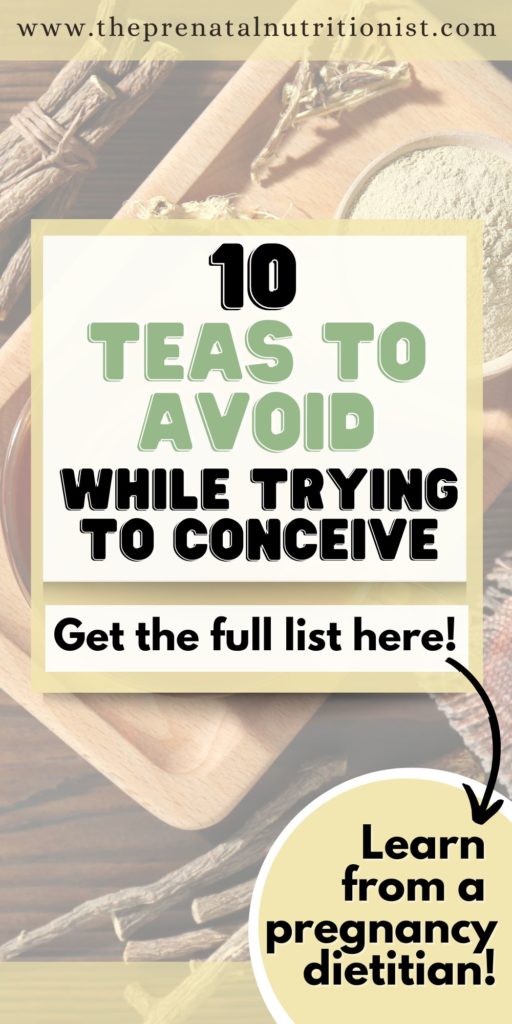
When starting a family, the journey to conception can be entirely different from one person or couple to another. Some may find that it happens effortlessly, and others may find it much more difficult. In fact, 1 in 6 people around the world struggle with fertility. Contributors to difficulty conceiving can range from hormonal imbalances to unknown reasons from the male or female.
Of course, nutrition plays a crucial role both during pregnancy and preconception. Foods and the nutrients we consume play a role in our overall health, hormone production, and even the health of our reproductive system. While some foods can enhance fertility, some foods and beverages are best to limit or avoid. Herbal teas can offer many benefits. There are also herbal teas with ingredients or herbs that may not support conception efforts and those recommended to avoid during pregnancy.
From lack of research to suspected or known potential to cause adverse effects, using some herbs and herbal teas warrants caution. Rest assured, there are herbal teas that are both safe and beneficial to enjoy during preconception and pregnancy. I also think knowing which ones to avoid during pregnancy and conception is helpful. In this post, we will look at some teas to avoid during preconception and pregnancy.
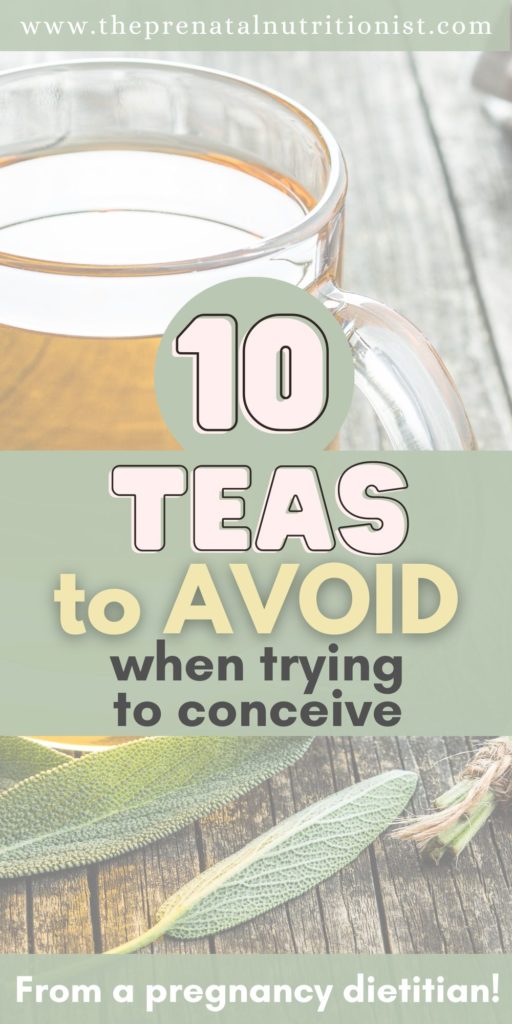
10 Teas To Avoid While Trying To Conceive
Laxative or “Detox” Teas
These popular teas contain herbs and ingredients to stimulate bowel movements and “cleanse” the body. Overuse could lead to cramping, uterine contractions during pregnancy, or diarrhea. Diarrhea can result in dehydration and electrolyte imbalances. If you’re battling constipation, I would instead recommend plenty of fluids, fiber, and magnesium as a first line of defense.
Water with lemon or a gentler tea like peppermint, ginger, or chamomile are good alternatives.
Juniper
Juniper is an herb not uncommon in the detox teas mentioned above because it has been traditionally used for its diuretic effect. Individuals may also choose to drink juniper tea for purported digestive benefits or when recovering from an illness with respiratory symptoms. Unfortunately, juniper may lead to contractions or negatively impact hormone health. This is not ideal for women who are trying to conceive or are pregnant.
Chamomile is an excellent swap because it is high in antioxidants and offers possible digestive health benefits. When consumed in moderation, it’s safe to drink during pregnancy, too. Stick less than 2 cups per day during preconception and pregnancy.
Licorice Root Tea
Licorice root tea contains glycyrrhizin, which can affect cortisol levels and potentially disrupt hormone balance. There was one study out of Finland linking large amounts of black licorice during pregnancy with lower IQ scores and a higher prevalence of ADHD for children after birth.
A cup of peppermint tea is generally considered a safe alternative to licorice root tea. Just be mindful that for some people peppermint is a trigger for heartburn.
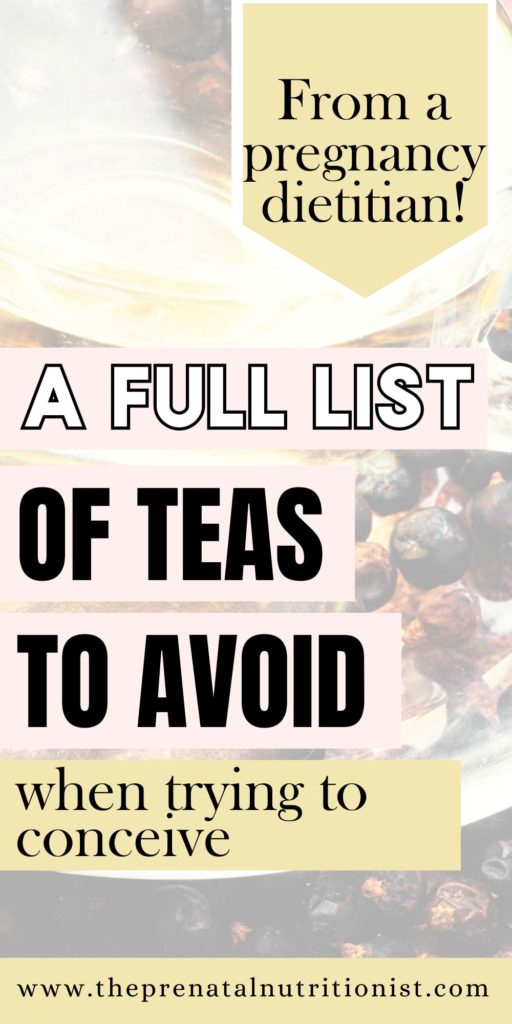
Sage Tea
Tea made with the herb sage is generally not recommended during preconception or pregnancy. Sage contains a compound called thujone, which can be harmful in high amounts. This compound may also stimulate uterine contractions, potentially disrupting implantation or causing adverse effects during pregnancy.
Instead, consider opting for red raspberry leaf tea. It offers many antioxidants, plus a few minerals like potassium and magnesium. It’s anecdotally said to be beneficial for ovulation, and you must ovulate to get pregnant. More evidence is needed to confirm this benefit.
Ginseng Tea
Ginseng is another herb about which we worry about the possibility of uterine-stimulating effects. It may also impact hormones like estrogen, which are important to have in balance for the menstrual cycle and ovulation.
Nettle leaf tea is a great alternative; it is rich in nutrients and supports overall health.
Hibiscus Tea
Hibiscus tea is not recommended for women trying to conceive or pregnant for a few reasons. It is also best to avoid hibiscus while trying to conceive since research has found it has the potential to interfere with normal hormone production and balance, as well as prevent the implantation of a fertilized embryo.
Try green tea instead; you can even find caffeine-free options. Green tea is generally lower in caffeine than a cup of coffee. It may even have fertility benefits. However, it’s important to drink in moderation because of the caffeine and the tannins. Tannins are compounds that may interfere with nutrient absorption. Stick with up to 1-2 cups per day.
Cascara Tea
Cascara originates from the coffee plant. So it does have some caffeine, but not nearly as much as coffee. Cascara is more commonly found in tea blends than on its own. Its laxative effect may lead to diarrhea or uterine contractions, so it’s best to avoid it during preconception and pregnancy.
Instead, opt for lemon balm tea! It is a calming alternative and supports digestion and relaxation.
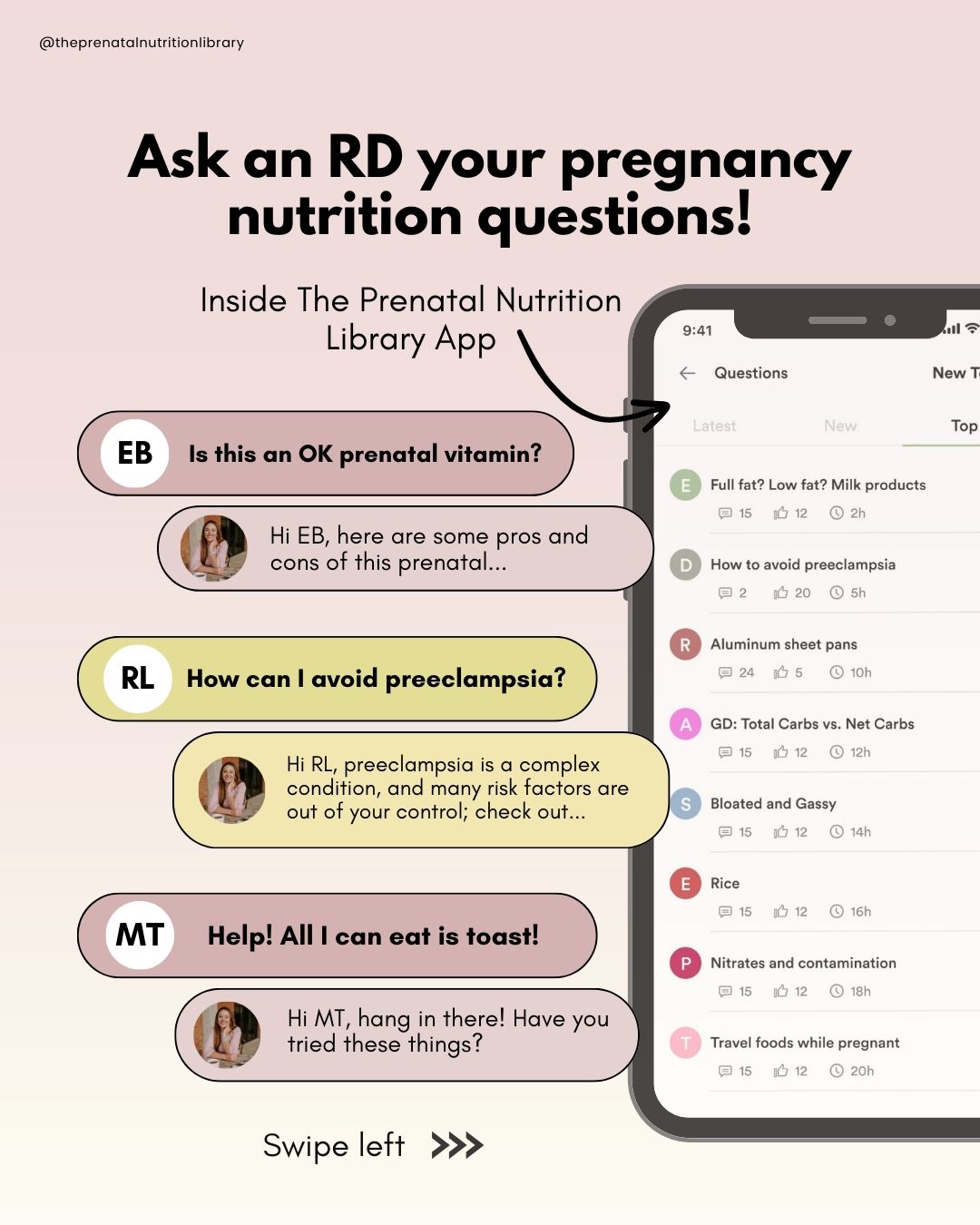
St. John’s Wort
You may find St. John’s Wort on its own or in a mood- or stress-supporting tea blend. This herb has many potential medication interactions. Some are concerned that it may increase the risk of birth defects, particularly when consumed in the early stages of pregnancy.
Rooibos tea, which is caffeine-free and rich in antioxidants, is a great alternative to enjoy during both preconception and pregnancy.
Ephedra Tea
Ephedra may also be called green Mormon tea, Brigham tea, or Indian tea. It’s often used for weight loss, allergies, and congestion. It may raise heart rate and blood pressure or negatively impact ovulation.
Maca root tea is a safe and delightful alternative, helping to balance your hormones and fertility health. Try this one!
Ginkgo Biloba Tea
Ginkgo biloba tea contains ginkgolides, which can thin the blood and possibly increase the risk of bleeding. There is also minimal data on its safety or any potential benefits for preconception or pregnancy. It’s best to pass on this one!
Instead, ginger tea is a good option because it has more research on its use and may support digestion. Plus, it may help to curb early pregnancy nausea.
Note: this blog contains affiliate links; at no extra cost, if you click and purchase something, I will make a small commission.
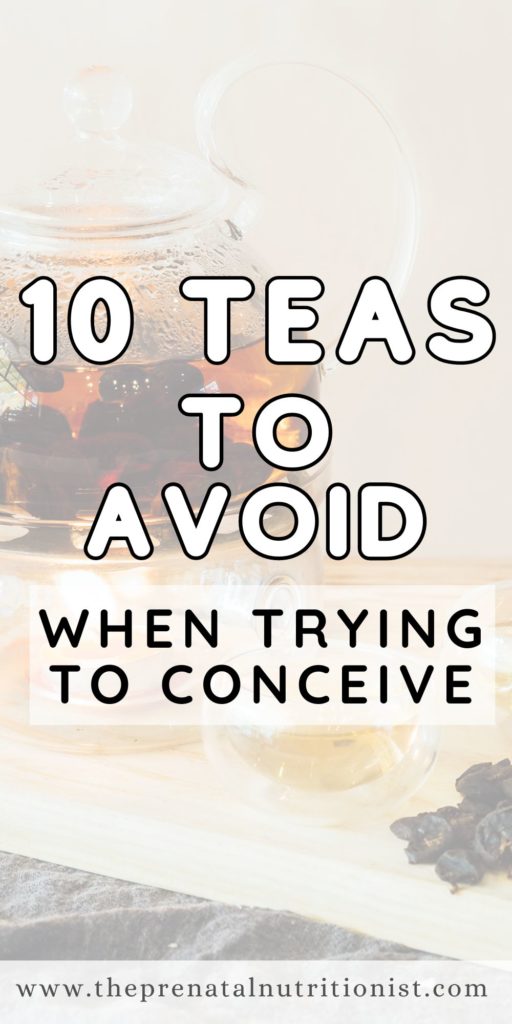
Herbs can be confusing during preconception and pregnancy; we can help!
If you enjoy a cup of hot tea daily, knowing the safety of teas during pregnancy and preconception can help ease stress with beverage choices during this time. While we reviewed a list of 10 herbal teas to avoid while trying to conceive and during pregnancy today, there are many that can be included.
Inside The Prenatal Nutrition Library app, we review more in-depth information on teas, herbal teas, caffeine, decaf coffee, black tea, green tea, and coffee alternatives!
Inside the library, you’ll gain access to valuable information on nutrition topics for every stage of your preconception and pregnancy journey. From delicious recipes to support fertility and pregnancy to taking out the stress of knowing what is safe, you can take the stress out and start confidently nourishing your body. All the information is backed by science but easy to understand to take any guesswork out of this beautiful time in your life!


